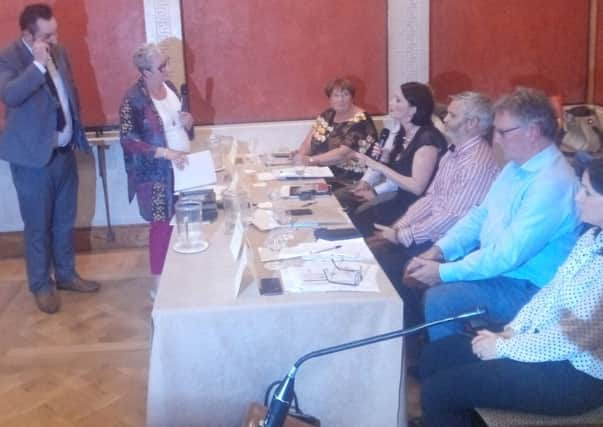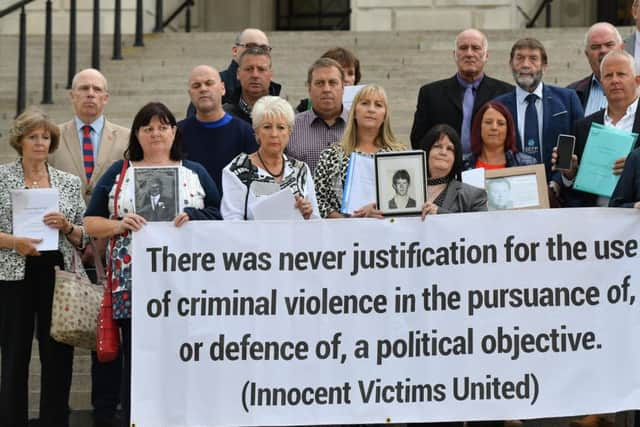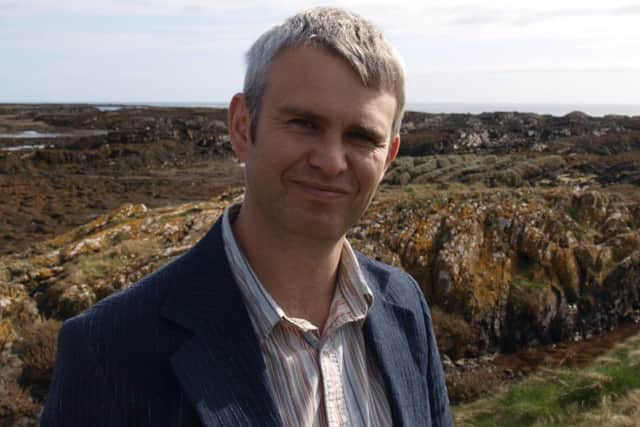Terror victims did not accept DUP was at Stormont '˜to listen', because party had already agreed legacy plan in 2014


That was not only in evidence in the party’s u-turn on the Maze/Long Kesh peace and conflict transformation centre, but in its uncertain, slow and contradictory response to the consultation document on dealing with the past published in May by the Northern Ireland Office.
I chaired the victims’ debate at Stormont on Monday evening and witnessed the emotion and anger that were subsequently reported in the News Letter (see link below).
Advertisement
Hide AdAdvertisement
Hide AdI had previously chaired a similar event run by SEFF in Portrush where one audience member held up a copy of the consultation document while despairingly asking ‘Why is our government doing this to us?’


The question was repeated but with an emphasis on the DUP at the Stormont meeting.
The audience of mostly victims and survivors did not accept the argument of Emma Little-Pengelly that she and the DUP were only there to listen. After all, the proposals now on the table are not very different from what the DUP agreed in the 2013-14 period.
The anger perhaps stemmed from the frustration of not being listened to; but it may also be a signal that the opportunities for victims to gain recognition of their experiences and sufferings are steadily being eroded.
Advertisement
Hide AdAdvertisement
Hide AdIf this is correct then the debate over the access for truth and justice for victims who have already received a report by the desk-based review of the Historical Enquiries Team that Ms Pengelly revisited on Wednesday (see link below) is a red herring.


In other words, any extended access to an investigation can be framed as a concession won by the DUP, but the problem of focus will remain.
This problem is paradoxical, because although with each iteration of this debate, the level of detail expands, the lens narrows. Like a kaleidoscope where the arabesques around the edges detracts from the centre, the current proposals hid a state-centric obsession in full view.
The restriction of attention, in other words, on (some) killings works to erase the PIRA’s campaign of bombings, intimidation along with its cross-border dimensions.
Advertisement
Hide AdAdvertisement
Hide AdAgain, although the consultation documents and draft bill purport to be victim-centred, there will be little if any victim oversight on its processes and reporting — all of which will be carefully policed by lawyers and academics with politicians and the two governments looking over their shoulders.
These outworkings are unsurprising given the intellectual provenance of the proposals within transitional justice — a school of thought, with a centre at Ulster University, which deals with countries moving through extraordinary circumstances.
Typically, this has been applied in situations where the state has been the main perpetrator of violence and the legitimacy of the legal system placed in doubt.
Ideologically, those outworkings skew towards republicanism, which can minimize the horrific history of PIRA violence aided and abetted by third sector organizations whose existence, outreach and funding depend on reproducing claims of systemic collusion.
Advertisement
Hide AdAdvertisement
Hide AdThe telescoping of focus and concentration on the state then facilitates the wishing-away of historical culpability on the part of republicans (and, of course, loyalist terrorists).
Instead of the past being a difficult terrain, the supporters of a movement that killed 2,000 people, within and without Sinn Fein, find it easily negotiable.
That maximalist demands continue to be made by that broad grouping demonstrates that the end goal isn’t just the continued marginalisation of victims and survivors, it is the complete disarticulation unionist collective memory and rationalization of the Union.
The DUP seemingly hope to erect a firewall between the PSNI (under whose remit the HET fell) and the proposed way forward.
Advertisement
Hide AdAdvertisement
Hide AdIn so doing, the party seems willing to sacrifice the history of the RUC. The party seems sure it can control the process — or, at least, unionist responses to it.
Disrupting the legislative proposals or walking away may delay justice, but pursuing them or trying to reform them may only make things worse.
• Dr Cillian McGrattan is a Ulster University academic